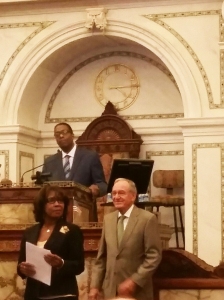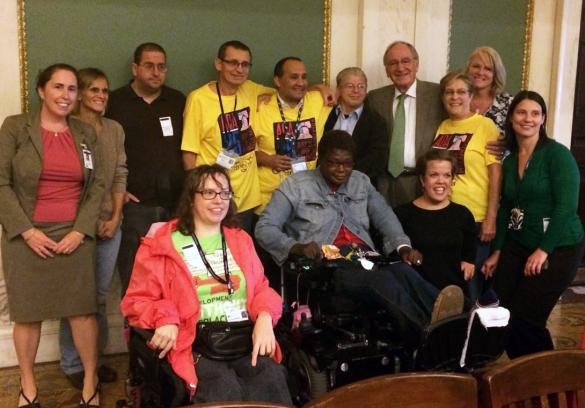July is when the nation celebrates its Independence Day, and this year, the month will mark a major milestone commemorating another level of independence for millions of Americans.
On Saturday, Philadelphia will join in the yearlong celebration of the Americans with Disabilities Act as it hits its 25th anniversary. The 1990 law prohibits discrimination and mandates equal opportunity for people with disabilities in employment, government services and public accommodations — including commercial facilities and transportation.
“Without a doubt, this is a law that literally opened doors for and eyes to our many neighbors whose talents had been hidden by our own misperceptions,” said PCHR Executive Director Rue Landau. “The legal and cultural impact of the ADA can be seen everywhere, from the city’s Fair Practices Ordinance that guides our work to chirping traffic lights that assist for the visually impaired.
“Most importantly, a whole generation has grown up accepting people with disabilities simply as people,” Landau said. “And that will be the standard for generations following them.”
PCHR is one of dozens of organizations sponsoring the city’s daylong festivities that will kick off with speeches and opening of an outdoor resource fair and conclude with a parade and disability pride march from City Hall to Independence Mall and closing reflections. The action is set to begin at 10:30 a.m.
For people who once were considered part of a hidden population, those with disabilities increasingly are being recognized by and reflected in the American mainstream – from integrated classrooms to fearless super spies on television.
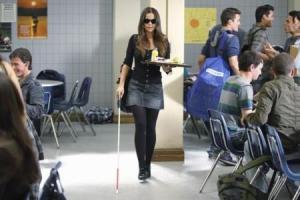
TV shows like “Pretty Little Liars” and “Covert Affairs” featured blind characters that were fearsome.
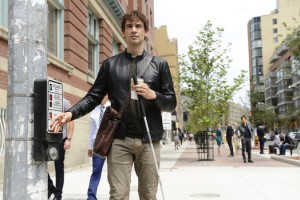
About 1 in 20 school-aged children in Greater Philadelphia has at least one disability according to the U.S. Census Bureau. By conservative estimates, some 1 in 6 Philadelphia households includes someone with a disability. Yet, just 3 in 10 eligible people with disabilities are working, an unemployment rate that has remained stubbornly fixed for decades.
So while there will be plenty of cheers and smiles on Saturday, it’s clear that more work remains ahead, said Charles W. Horton Jr., executive director of the Mayor’s Commission on People with Disabilities. Even after 25 years of concerted efforts, complete and equal access to education, transportation, housing and employment opportunities is not yet in hand, which directly impacts quality of life.
“One thing that people don’t understand is that it’s not just about accessibility,” Horton said. “It’s about independence. It’s about freedom. Once we get people to address that there is an issue, we have the ability to make change that is important.”
Of course, as the birthplace of American freedom, it’s no surprise that Philadelphia has been on the forefront of disability rights, even before federal law was enacted.
Horton’s office traces its roots to the Rizzo Administration, which began to focus on issues faced by those who were “handicapped or had a disability.”
By 1986, Mayor W. Wilson Goode Sr. formalized the office, establishing the commission by executive order.
The 1993 federal decision in Kinney v. Yerusalim held that whenever Philadelphia streets were updated or resurfaced, curb cuts and other ADA-prescribed accommodations also must take place. Today, such curb cuts are simply part of the landscape, like the various maple and cherry trees that dot the city.
The literally ground-breaking changes that stem from the ADA now are almost taken for granted.
Elevators at train stations. Wheelchair-accessible bathroom stalls. Automatic doors at public buildings. Closed captioned broadcasts. By their commonplace nature, normalcy and acceptance has grown.
But physical improvements are among the easier ones to note and address, said PCHR Chair Thomas H. Earle. He also heads Liberty Resources Inc., a disability advocacy and services nonprofit.
“Not all disabilities are visible,” Earle said. “It’s easy to see someone with a wheelchair or a mobility device. But we also have people with autism, intellectual disabilities, post-traumatic stress disorder and more. These are disabilities as well. And the law is broadly written so that they, too, can be protected.”
Quantifying and qualifying who is disabled – a cancer patient vs. a child exposed to horrific violence vs. a teen with HIV – are parts of ongoing discussions, both inside policy circles and among advocates, Horton said. But only by finding common ground and banding together will meaningful progress continue – progress that ultimately benefits all of society.
After all, the world would be less vibrant without the contributions of Stevie Wonder to music, Charles Schwab to business, Melissa Stockwell or Jim Abbott to sports or John Hockenberry to journalism, among just a few examples.
“We must continue to fight,” Horton said. “It’s not over, because people with disabilities have the right to have a full life, too.”
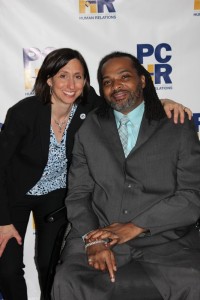
PCHR Executive Director Rue Landau hangs with Mayor’s Commission on People with Disabilities Executive Director Charles W. Horton Jr.
To volunteer for Saturday’s events, contact Temple University’s Institute on Disabilities at shoes100@temple.edu or call (215)204-1356 or Vision for Equality at mdevaney@visionforequality.org or call (215) 923-3349.
